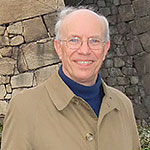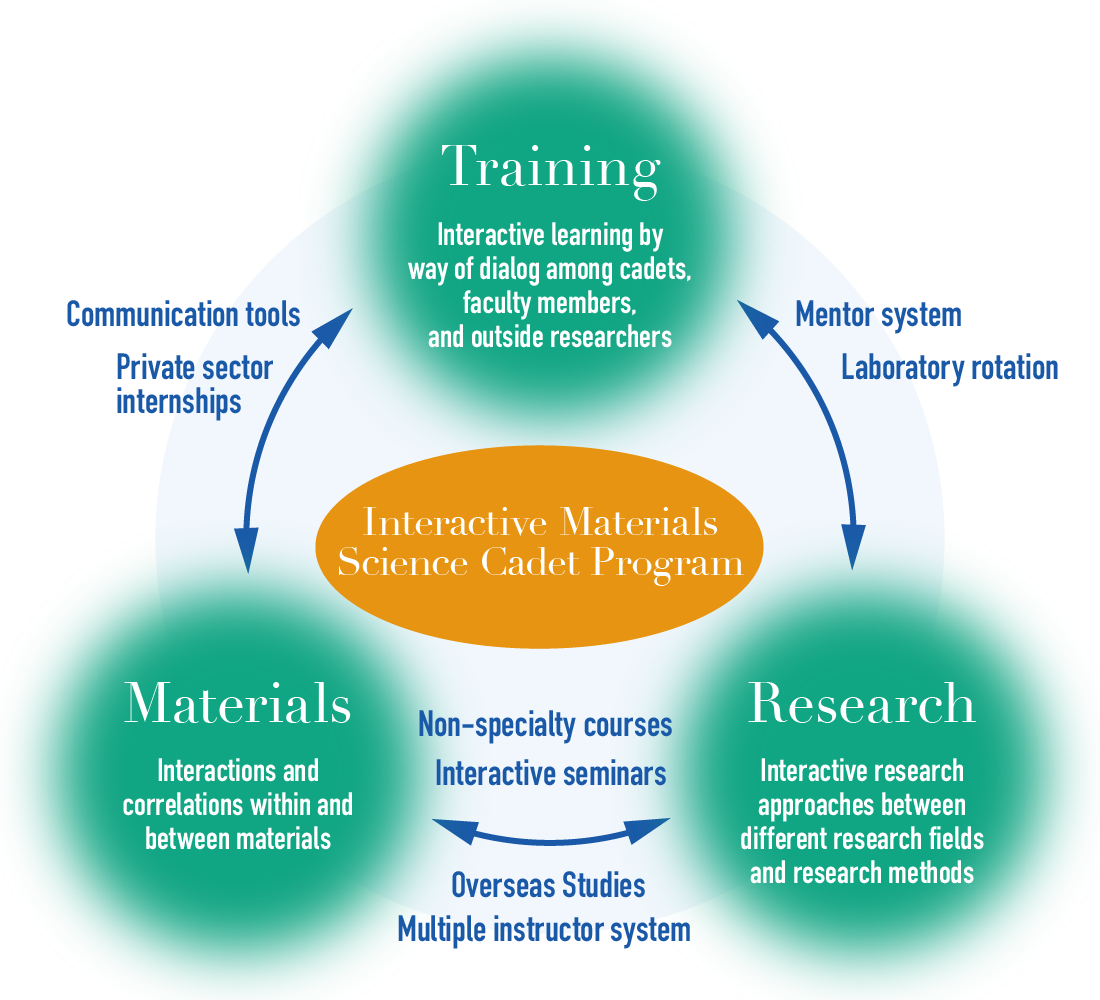Program Features
HOMEProgram Features
Program for Leading Graduate Schools:
INTERACTIVE MATERIALS SCIENCE CADET PROGRAM
The Interactive Materials Science Cadet Program is a collaborative program designed to drive innovation in materials science research and business by preparing outstanding PhD students to assume leadership roles in industry, government, and academia. The following graduate schools at Osaka University participate in the program: Graduate School of Engineering Science (Department of Materials Engineering Science, Department of Mechanical Science and Bioengineering, and Department of Systems Innovation), Graduate School of Science (Department of Physics, Department of Chemistry, Department of Biological Sciences, Department of Macromolecular Science, and Department of Earth and Space Science), and Graduate School of Engineering (Division of Biotechnology, Division of Applied Chemistry, Division of Precision Engineering and Applied Physics, Division of Mechanical Engineering, Division of Materials and Manufacturing Science, Division of Electrical, Electronic and Infocommunications Engineering, Division of Sustainable Energy and Environmental Engineering, Division of Global Architecture, Department of Management of Industry and Technology, and Department of Adaptive Machine Systems).
Program Features
The Interactive Materials Science Cadet Program is part of the Program for Leading Graduate Schools scheme, which is coordinated by the Ministry of Education, Culture, Sports, Science and Technology of Japan. The Program for Leading Graduate Schools is designed to dramatically reform graduate education programs. The goal is for Japan’s higher education system to be globally recognized as producing top-tier graduates. The Interactive Materials Science Cadet Program is a five-year consecutive program in materials science established in partnership by the Graduate School of Engineering Science, the Graduate School of Science, and the Graduate School of Engineering at Osaka University. Each year, around 10 students from the materials science-related divisions and departments of these three graduate schools are admitted. In addition to the standard coursework required for their specific department and graduate school, selected students undertake special program courses and become “Materials Science Cadets” in materials science research and enterprise. Materials Science Cadets are mentored by and work alongside program coordinators, who are experts in diverse fields and methodologies related to materials science (such as chemistry, physics, material synthesis, functional materials design, material characterization, and theoretical analysis). The program strives to produce young talent able to drive innovation by assuming core roles in research and enterprise related to materials science. Materials Science Cadets are future leaders in a wide range of sectors spanning industry, government, and academia.
Welcome to the Interactive Materials Science Cadet Program
Human history is closely tied to developments in the processing and utilization of naturally occurring materials such as plant matter, animal skins and metals, as well as to the creation of new artificial materials such as plastics and highly pure silicon devices. Breakthroughs in materials science can bring about dramatic changes in our lifestyles, meaning that materials science will inevitably play an ongoing and vital role in our future. Materials science contributes to improvements in our daily lives through the invention of new functional materials, measurement techniques and synthesis processes as well as the discovery of new physical phenomena in keeping with, sometimes in advance of, changes in industrial processes and also in basic social structures. These inventions and discoveries also serve to strengthen present industries and facilitate the emergence of new industries. The program aims to educate talented graduate students by training them as ‘Materials Science Cadets’, equipping them with the skills required to occupy senior research positions in the materials science and production sectors. The program will be implemented with the full support of Osaka University faculty from a wide range of materials science fields including physics and chemistry. The program is also designed to apply the synergistic benefits of dialogic and interactive approaches to various facets of materials science education and research. In particular, the key concept of interactivity is applied to:
- Materials: interactions and correlations within and between materials
- Research: interactive research approaches among different research fields and research methods
- Training: interactive learning by way of dialogue among students, between students and instructors, among instructors, and between students and outside researchers and engineers
The program's multifaceted curriculum organically links various interactive ideas and approaches together by combining a range of components including multiple-teacher systems, laboratory rotation, liberal arts subjects, career guidance, private sector internships and overseas study opportunities. The curriculum is designed to train talented researchers with specialized skills in research fields related to materials science, with a particular emphasis on the following:
- Genuine interest in research fields and methodologies outside one's own field of specialization, combined with the ability to conceive broad-minded and multifaceted approaches based on theoretical and practical knowledge in areas such as theory and evaluative analysis and manufacturing and evaluative analysis
- Communication skills for discussion and debate with specialist researchers in other fields
- Ability to identify and resolve issues in a systematic and autonomous fashion
- Creative capacity for “serendipity,” i.e., the ability to discern connections and relations without being constrained by conventional thinking
- Flexibility to adapt to changes in the wider world and the evolving needs of society
- International outlook and powers of persuasion
Message

Pierre BRAUNSTEIN
CNRS Research Director (Member of French Academy of Sciences), Coordination Chemistry Laboratory, Institute of Chemistry, University of Strasbourg
Looking forward to fruitful joint events
Fostering international academic exchanges through the mobility of master and PhD students is essential, not only to advance their scientific knowledge but also to broaden their culture. The JSPS Program for Leading Graduate Schools implemented in Osaka, Interactive Materials Science Cadet Program, plays a key role in promoting them.
The previous achievements under the GCOE program on Bioenvironmental Chemistry were most impressive and all the colleagues and students from Strasbourg who have benefited from its support have been most impressed by the many joint Symposia and have thoroughly enjoyed the science and the wonderful and generous hospitality. We wish you all the best for the future and look forward to many more numerous and fruitful joint events between Osaka and Strasbourg.



ASHIDA Masaaki
Interactive Materials Science Cadet Program
Program Coordinator
The program is designed to nurture the above skills and competencies in graduates so that they be equipped to take on leadership roles and armed with the flexibility to resolve the issues that arise over the next 10 to 20 years. Graduates will also be able to proactively identify potential issues at an early stage and develop new trends in materials science research. This program will be launched as a new integrated five-year doctoral course in materials science, and is promoted collaboratively by the Osaka University Graduate Schools of Engineering Science, Science, and Engineering. By way of this program, graduates can gain not only fundamental research capabilities but also skills relevant to industry and wider society. Our world-class principal investigators are at the forefront of their respective fields, providing postgraduate students with the opportunities required to enter their fields of choice. By taking an ever more interactive approach with this program, we seek to encourage graduate students to become future leaders in a wide range of areas related to materials science research.